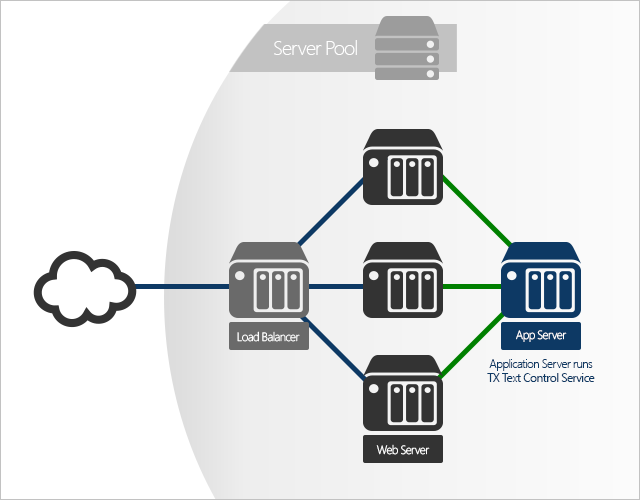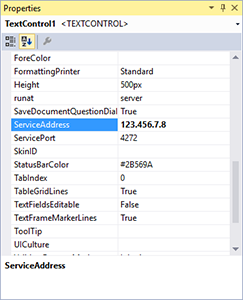TXTextControl.Web Web Forms and MVC: Routing Service Calls to a Separate Application Server
Since version X13 (23.0), the required TX Text Control Service can be installed on one or more separate servers that are independent from the web servers. This has two significant advantages: The TX Text Control Service work load doesn't have any influence on the web server and the required responsiveness for web requests and web servers can be part of a load balancing environment. The following illustration shows a single application server that runs the TX Text Control Service behind the…

Since version X13 (23.0), the required TX Text Control Service can be installed on one or more separate servers that are independent from the web servers. This has two significant advantages: The TX Text Control Service work load doesn't have any influence on the web server and the required responsiveness for web requests and web servers can be part of a load balancing environment.
The following illustration shows a single application server that runs the TX Text Control Service behind the web server pool. These web servers can be also behind a load balancing server as shown in the illustration:

Within the Web Forms control, the ServiceAddress property can be set directly in the Visual Studio Properties window:

Using the MVC version, the ServiceAddress property can be adjusted in the HtmlHelper:
@Html.TXTextControl().TextControl(settings =>
{
settings.ServiceAddress = IPAddress.Parse("123.456.7.8");
settings.ServicePort = 4272;
}).Render()This new feature also allows you to host your web project on Azure Websites as long as the TX Text Control Service runs on an Azure virtual machine instance and the ServiceAddress is pointing to this server.
Related Posts
Securing WebSocket Connections in ASP.NET Core using Sec WebSocket Protocol…
This article explores how to secure WebSocket connections in ASP.NET Core applications by utilizing the Sec-WebSocket-Protocol header for authentication and authorization purposes.
ASP.NETJavaScriptDocument Editor
Detect Toggle Button Changes Using a MutationObserver
This article shows how to detect changes of toggle buttons in the ribbon of the web editor using a MutationObserver. The state of a toggle button in the ribbon visualizes the state of a certain…
Load Balancing: Using Different TCP Service Locations using a Custom…
The Text Control online document editor requires a backend TCP service to synchronize the document rendering. This article explains how to route the synchronization traffic to different servers…
AngularASP.NET CoreDocument Editor
Angular: Deploying the Backend TCP Service Separately
The Angular document editor requires an ASP.NET or ASP.NET Core backend connected to the TCP Service to synchronize the rendering. This article explains how to deploy the TCP Service separately…
Implementing Conditional Table Cell Colors with MailMerge
This ASP.NET MVC sample shows how to implement conditional table cell colors using the online document editor and an ASP.NET backend.

